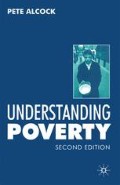Abstract
Poverty, as we saw in Chapter 1, is a political concept. Thus academic interest in defining and measuring poverty, and academic research into the extent of poverty, have always been closely related to attempts to utilise such academic work to influence policy development or reform. Moreover political debate on poverty and antipoverty policy has always been a contested and even a conflictual arena. Thus the problem of poverty has produced political activity, and this has been true for at least the last 150–200 years of industrial society in Britain and elsewhere. Indeed the political activity generated by the problem of poverty has been growing gradually, although with increasing rapidity, over the last century or two. It is also becoming more organised and more varied, and increasingly the debate has focused not just on whether to politicise poverty, or what poverty to politicise, but also on how to organise political activity and who should be involved in this. We shall look at these issues in a little more detail shortly.
Preview
Unable to display preview. Download preview PDF.
Editor information
Copyright information
© 1997 Pete Alcock
About this chapter
Cite this chapter
Alcock, P. (1997). The Politics of Poverty. In: Campling, J. (eds) Understanding Poverty. Palgrave, London. https://doi.org/10.1007/978-1-349-25666-2_13
Download citation
DOI: https://doi.org/10.1007/978-1-349-25666-2_13
Publisher Name: Palgrave, London
Print ISBN: 978-0-333-69280-6
Online ISBN: 978-1-349-25666-2
eBook Packages: Palgrave Social & Cultural Studies CollectionSocial Sciences (R0)

